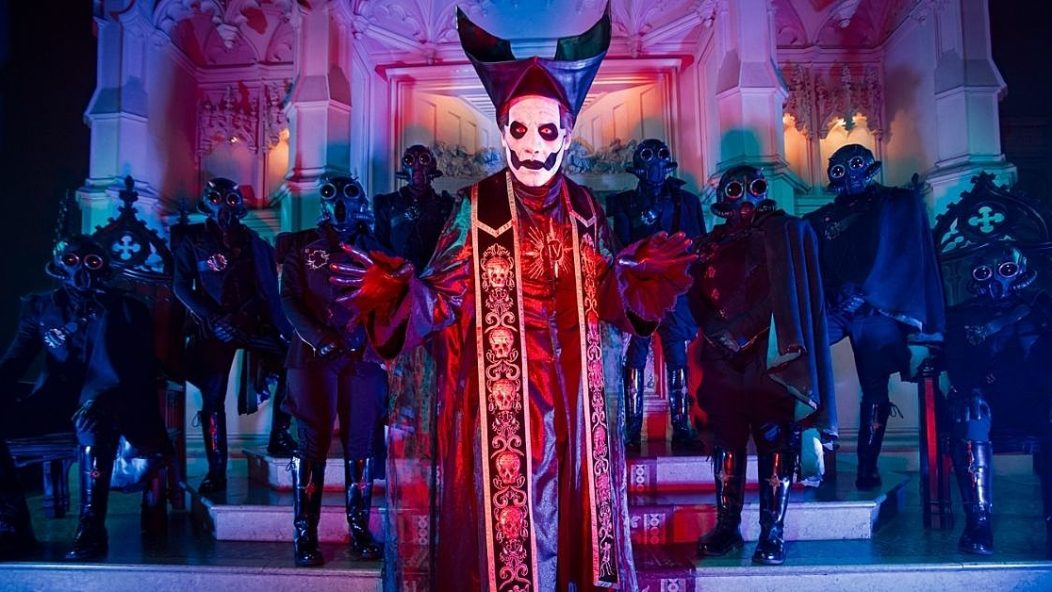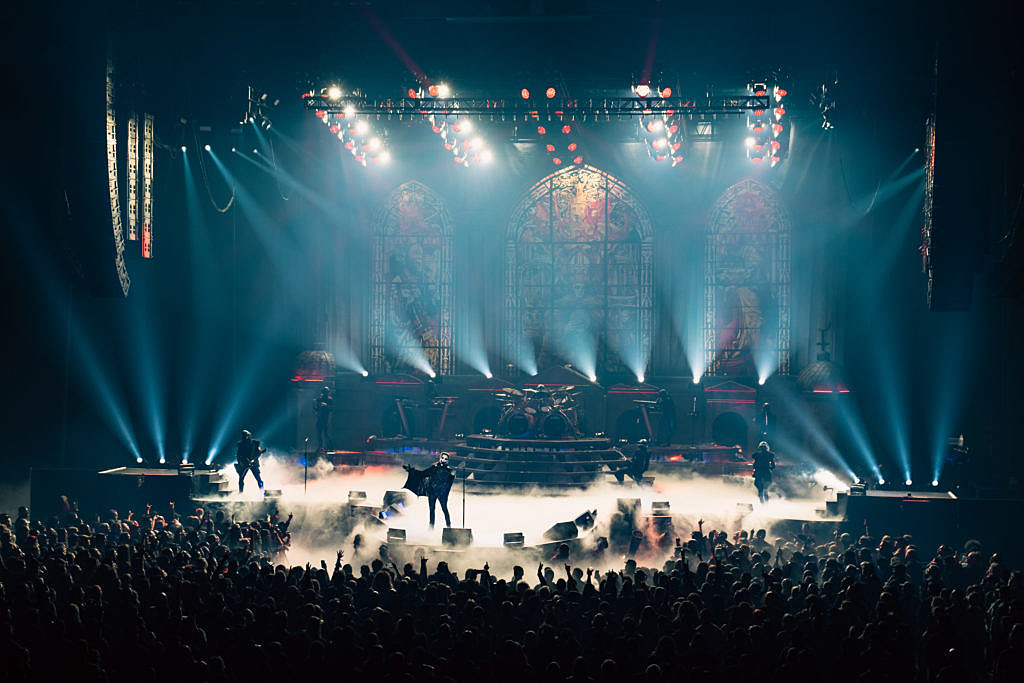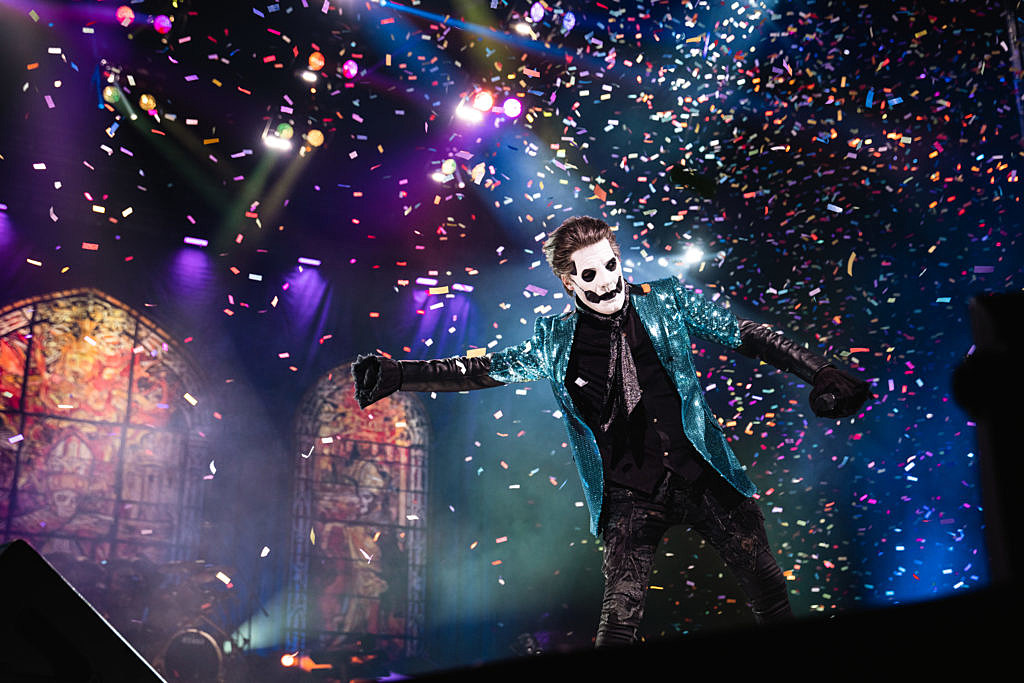
Ghost: “We’re not a nostalgia band; I refuse to be there yet”
TOBIAS FORGE IS CONCERNED. It’s Valentine’s Day in Pittsburgh, where Ghost are halfway through their co-headline tour with Volbeat, but the only love the Swedish mastermind is pining for is that of the listening public, who he fears are about to be overwhelmed by a deluge of music. “We’re facing an insane tsunami of bands,” he explains in a tone reserved for the worst possible news. “Every band on the planet, even the ones you thought were dead, are coming back. That is not a good thing.”
When Forge suggests this, he really means that it’s not good for Ghost. It’s this laser focus on the fortunes of the band he’s led since 2006 — and attention to detail on the important, but not necessarily sexy, business behind the scenes — that’s helped transform Ghost from kooky concern to Grammy-winning, world-straddling rock behemoths; an unlikely success story encompassing bucked trends and, sadly, some scorned friends along the way. And let’s not forget the music itself: irresistible confections that blend psychedelic tones, classic metal riffs and gothic pomp, most recently via fifth album, Impera; all delivered by a lascivious pope backed by figures seemingly styled by director Guillermo del Toro.
Read more: My Chemical Romance release first new music since 2014, “The Foundations of Decay”—listen
Given what a tricky sell Ghost were, not least in the disparity between their terrifying look and surprisingly accessible sound, one wonders if they ever suffered the indignity of being laughed out of the room during their early meetings. “Ah, you’re wondering if there’s a Decca story,” Forge ponders, referencing the Beatles’ unsuccessful audition for Decca Records Jan. 1, 1962, after which the label’s executives told their manager Brian Epstein that “the Beatles had no future in show business” because “guitar groups are on the way out.” Thankfully, Forge didn’t have to deal with feedback so crushingly wide of the mark, but it didn’t really matter back then, anyway.
“I wasn’t aiming insanely high at the beginning,” he explains. Instead, he saw Ghost as being a marginal act that could hold experiential performances in the sort of spaces in which you’d expect a band fronted by a demonic pope to appear — churches, art galleries, the odd haunted house — rather than traditional club venues. “Some of that was pragmatism on my part,” he admits. “I thought my rock ’n’ roll dream had passed and that train had left the station. But then it turned out the train was still standing in the station, and we could become a normal touring band.
“It suddenly seemed that the sky was the limit, so I took that chance.”

Read more: The Black Dahlia Murder vocalist Trevor Strnad passes away at 41
WHEN IT COMES TO THE BIG TIME, Tobias Forge is something of a late bloomer. Aged 7, he was on course for it as he sashayed around the living room of his childhood home in the Swedish city of Linköping, pretending to be Freddie Mercury and Mick Jagger. By the time Ghost’s debut album, Opus Eponymous, was released in 2010, however, he was nearly 30. “I was not successful at all for the first 30 years of my life,” he says. “I hadn’t made a fucking penny from making music. Then, all of a sudden, I was given this chance, late in life, career-wise.”
30 is no age, of course. But compared to the heroes Forge admired, linchpins in their respective bands, you wouldn’t blame him for thinking he was lagging slightly behind. Steve Harris was 24 when Iron Maiden’s self-titled debut album was released in April 1980. When Metallica’s full-length debut, Kill ’Em All, was released in July 1983, James Hetfield was just 19. Interestingly, one of Forge’s favorite films as a kid was Let’s Spend The Night Together, a live document chronicling the Rolling Stones’ 1981 North American tour, released in 1983. And how old was Jagger in 1983? 40. How old is Forge at the time of this chat? The same, despite his startlingly boyish appearance.
Read more: 15 metal artists who went solo and blew audiences away even more
There is something curious about the idea of Forge, a man conscious of advancing years, growing up worshiping Jagger, not in his youthful pomp, but as he entered middle age. And the fact that he portrays the lineage of Papa Emeritus, from the first version to the fourth, with each, like Benjamin Button, getting younger and more energetic. Is it coincidental? “We are going to rendezvous in our mid-40s,” he says of his impending collision with his alter ego. “I just had to get some Viagra inside him very quickly.”
Forge tends to make jokes when he’s conscious he might be revealing too much, but he soon drops the levity in favor of digging deeper into his origin story. “Being a fan of horror and metal has made this very intuitive, whereas with other projects I’ve had, it’s been unintuitive because I didn’t really know what to do,” he explains. “It’s so much harder when you can see your own face. It’s much harder to know what you are, especially when you try to come up with a story. I wasn’t a singer-songwriter who’d been in the military like James Blunt. I didn’t really have a story, so I had to make one up.”
Read more: 7 times rock fought back, from Rage Against The Machine to Pussy Riot
He’s doing himself a disservice, even if his early musical forays were as commercially unremarkable as they were diverse. There were his early bands Repugnant and Crashdiet, death metal and glam metal, respectively, in which he went by the name Mary Goore. Then there was Subvision and Magna Carta Cartel, purveyors of pop rock and alt-rock, respectively. The latter band featured members of the first incarnation of Ghost, who portrayed the masked Nameless Ghouls and would subsequently instigate a lawsuit against Forge, believing they were entitled to a share of royalties, despite receiving a fixed salary. The court ultimately ruled in Forge’s favor, though not without revealing Papa’s true identity to the world. The world, it turned out, didn’t care and embraced the man behind the mask without a moment’s hesitation.

Read more: Rob Reiner and the original ‘Spinal Tap’ crew return for ‘Spinal Tap II’
That’s one of the other striking things about Ghost’s success, aside from how much it flies in the face of popular thinking about there being a dearth of headliner-level rock and metal acts coming through: They have never been chasing some contemporary trend — largely because Forge’s enthusiasm for new music dropped off a cliff sometime around the early ’90s. “I was never into nü metal,” he says, laughing. “And I can’t stand crabcore and hardcore, so when we appeared, we had nothing in common with everyone else. We were the side freaks. When we started touring, we were among all these bands with sentences for names, and we sounded so retro next to them.”
While Ghost used their timelessness as an asset, for the man behind it all, being a singular person out of step with everyone else proved a rather lonely place. “What I’m missing is that strong contemporary scene that my heroes had,” he admits.
“I’ve seen footage of Iron Maiden talking about a metal festival in Germany in 1983 and all the heavy hitters being there, like Def Leppard, Whitesnake, Judas Priest and Accept. And, you know, Nirvana didn’t create the Seattle sound all by themselves; Seattle was Pearl Jam and Soundgarden and Alice In Chains and Mudhoney and all these other bands. And part of its creation was Heart being from the same city, Queensrÿche being from the same city [they’re actually from Bellevue, Washington] and the legacy of Jimi Hendrix. It takes a lot to create a scene.”
Read more: Nirvana, Pearl Jam, Soundgarden members form new band 3rd Secret, drop album—listen
“TWENTIES,” IMPERA’S SPECTACULAR LATEST SINGLE described by Forge as “Slayer meets Missy Elliott,” was inspired by music a million miles from Sweden — well, 6,500, to be precise. Years ago, Forge watched a documentary about a Brazilian rapper whose name escapes him, but from what he does recall, was responsible for a particularly aggressive style of reggaeton. At one point in the film, there’s footage of the unnamed artist performing in a favela — a slum area — to a crowd enthralled by his barking vocal attack and the fast, goading beat behind it. That sound, and the image of bodies rising and falling, stuck with Forge.

Read more: Kurt Cobain’s “Smells Like Teen Spirit” guitar is up for auction
Funnily enough, it’s that bacchanal indulgence in our modern world, and how it’s juxtaposed with abject misery, that’s at the heart of “Twenties.” Much like the 1920s, which was synonymous with both economic boom and the bust of The Great Depression, the 2020s is a time when revelry and wretchedness generally follow one another. It’s a warning for the future made more powerful by the fact that the choir singing the spooky chorus features Minou Forge, Forge’s daughter. She’s no stranger to working with dad, having sung on “Ashes,” the opening track from Ghost’s fourth album, Prequelle. Minou and her twin brother, Morris, are 13 now, the age Forge began not just losing interest in school but rallying against it, kick-starting his musical journey.
“As a father, my heart is always going to be super supportive,” he says of how he’d respond to his children following him into the family business while suggesting his own success is no guarantee of the same for them. “For some reason, when actors have kids, [the kids] miraculously become really good actors, too. But in music, it’s almost always, always, always the opposite. It’s almost like a curse, in fact.”
Impera is preoccupied with empires falling and new ones appearing in their place, so how does Forge think that could translate to the musical landscape? Last year, Ghost took their love of Metallica even further than supporting the thrash legends, as they did on a stadium tour in 2019, by tackling their most famous song. The Blacklist saw stars from all corners of music congregate to pay tribute to The Black Album, the record that transcended metal, with Ghost joining such artists as Mac DeMarco and Weezer in covering “Enter Sandman.”
Read more: 10 bands that prove why Misfits endure, from Metallica to My Chemical Romance
But when does Forge, the man who once described Ghost as “ambassadors” to Metallica’s “presidents,” think his own band might reach presidential status? “It’s hard to know if I will ever achieve what [Metallica] have achieved,” he responds soberly. If it sounds like he’s pouring water on the suggestion, then he is, but only because he’s not sure any act of this ilk could attain those heady heights nowadays.

Surely Ghost’s job is to ensure rock is the shit again, Alternative Press suggests, as Forge prepares for the evening’s ritual to a congregation of 12,500 at Pittsburgh’s Petersen Events Center. He agrees, but wants to do so powered by new music rather than leaning on past glories — so more Iron Maiden than the Rolling Stones.
“We’re not a nostalgia band,” he insists. “I refuse to be there yet. Maybe one day, when whatever I put out won’t matter, which is fine and natural. But I feel like this [album] is still relevant in the context of Ghost — it adds another 20% to peoples’ impression of the band. It’s adding to the bigger picture. That’s not talking about the commercial appeal of the record because I don’t know that; I just know that the vibe around the album is vibrating, and people are very fucking excited.”










